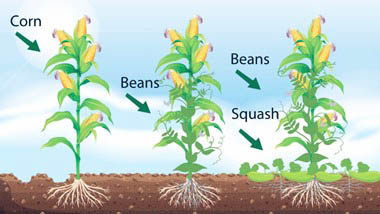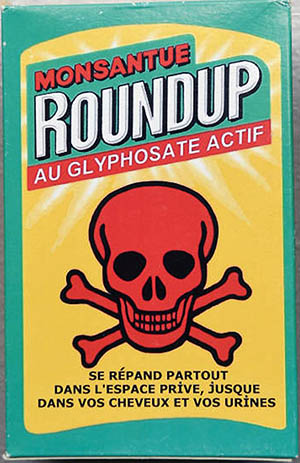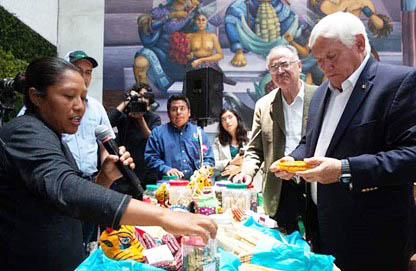|
|
|
|
The weekly newsletter of the México Solidarity Project |
|
|
|
Online at mexicosolidarityproject.org |
|
June 28, 2023/ This week's issue/ Meizhu Lui, for the editorial team |
|
|
ToyTokyo.com |
|
When Food Eats You: The NAFTA Diet |
|
Our ancestors all learned, over time, what plants and animals they could eat. They knew which ones could help keep them healthy and which could cure maladies — and which they had better avoid. They also experimented as they began to farm, and those experiments led to better health for the crops they cultivated and the humans who ate them.
Corn in México, as researcher and agricultural policy advisor Tim Wise tells us in our interview this week, followed that same basic pattern. But most agriculture today does not follow that pattern. Mega companies now generate the vast bulk of the food we eat. Their sole goal: mega profits.
These corporate concerns offer families fast, cheap, and filling foods, “healthy” only for unfilled pocketbooks. They hook kids with the plastic toys — all collectable of course! — they stuff into “Happy Meals.” Tortillas made in the USA, meanwhile, fill the shelves in Mexican stores. They contain traces of the herbicide glysophate and genetic material that carries artificially introduced DNA from unrelated organisms.
The result? An explosion of obesity and diabetes that maims and kills, a steady stream of deadly cancers and chronic disorders that endanger both food producers and consumers. The Mexican government has tried to push back against today’s “Frankenfoods.” The US, in response, has filed a complaint questioning México’s right to decide what Mexicans eat.
I once worked with a woman raised on a farm in Mississippi. Her family grew its own food but had no money. This woman headed north for a better paying job and found one at Goodyear Tire. She worked indoors breathing rubber fumes while NAFTA’s agricultural impact limited her food choices. What would you have done in her shoes? Would you have chosen to stay poor on a subsistence farm or live poor working at a city factory?
Some farmers in México, Tim Wise told me in our interview, are taking that first option. At least they’re consuming healthy food — instead of food that consumes them. |
|
|
|
Don’t miss an issue! Sign up for a free México Solidarity Bulletin subscription. |
|
|
|
|
Can the United States Dictate the Mexican Diet? |
|
Timothy Wise, a senior advisor at the Institute for Agriculture and Trade Policy, focuses his research and advocacy on the future of food, a concern that he explores in depth in his recent book, Eating Tomorrow: Agribusiness, Family Farmers, and the Battle for the Future of Food. Also the co-editor of the book Confronting Globalization: Economic Integration and Popular Resistance in México, Wise founded and directed the Globalization and Sustainable Development Program at Tufts University’s Global Development and Environment Institute. You can follow him on Twitter at @TimothyAWise. |
|
|
In the United States, most of us rarely think about corn until July 4 BBQ time! What significance does corn hold in México?
Corn originated in central México, where indigenous peoples domesticated corn over 8,000 years ago. They worshipped this staple food and humbly defined themselves as “the children of corn.” Scientists count over 60 distinct native corn species, and over 21,000 varieties have developed from these distinct species all around the country. Mexicans still have the battle cry: “Sin maíz, no hay país” — “Without corn, there is no country”! |
|
|
Photo: benitosmexican.com |
|
Maize still remains at the heart of the Mexican diet, providing an overarching share of the daily calorie and protein intake. In the West, we don’t think of corn as a protein source. But centuries ago Mexicans discovered a process called “nixtamalization.” By cooking corn with lime, corn flour — called masa — becomes easier to work with, more nutritious, and even tastes better!
NAFTA, the neoliberal free trade agreement, opened up México to US agribusinesses in 1994. What effect has NAFTA had on Mexican farmers?
Even before NAFTA, those farmers felt pressure from the US. The agronomist Norman Borlaug developed high-yield disease-resistant varieties of wheat in México in the 1960s, and that began what came to be called “the green revolution.” Similar innovation took place with corn, with the innovators claiming that the new “improved” varieties would stamp out world hunger.
These varieties, the argument went, would produce far more per acre than native plants, especially with fertilizers and chemical pesticides and herbicides spurring on their growth. “Green revolution” advocates encouraged México to abandon its own native varieties. They offered farmers what amounted to bribes — like free fertilizer — to switch.
So NAFTA essentially marked more the culmination than the beginning of the neoliberal project. NAFTA removed protections for Mexican domestic agricultural production, and US corn exports to México quickly grew by 400 percent. The US also deregulated its own agricultural sector, and that led to a crisis of overproduction. To get rid of the resulting surplus, the US resorted to “agricultural dumping” and sold corn and wheat to México at 5 to 40 percent below what that corn and wheat cost to produce.
Big agricultural businesses could outlast all these crises. Small farmers could not. So what ended up getting stamped out turned out to be not hunger and poverty but small farmers.
Before NAFTA, México only imported 7 percent of México’s corn. That share has now jumped to 38 percent, mostly yellow corn used for livestock feed. This in turn has caused a huge expansion of the livestock sector and taken land out of crop production. In effect, the United States exported the factory farm model to México. Joint ventures by US multinationals have now changed the agricultural landscape.
Did NAFTA affect the Mexican diet?
The corn flour products that have flooded into Mexican stores all carry less nutritional value than México’s native nixtamalized corn. The western system of mono cropping, by depleting the soil and replacing lost nutrients with chemical fertilizers, also undermines the production of healthy food staples. |
|
Traditional Mexican farmers didn’t use artificial means to spur plant growth or inhibit pests and disease. The milpa system indigenous farmers developed centuries ago kept corn, beans, and squash together. These “three sisters” kept the soil healthy year after year. With that system diminished, the “NAFTA diet” of imported processed foods replaced the balanced milpa diet. |
|
|
Freshpoint.com |
|
Junk foods, full of empty calories, became the new staples. México would become the #1 country in the world for childhood obesity.
US businesses also brought in GM — genetically modified — corn, but farmers pushed back. They filed suit to stop GM cultivation by seed giants like Monsanto and Syngenta. The farmers highlighted the need to protect maize biodiversity from GM pollen contamination.
These farmers, as one explained to me, would bring two kinds of tortillas to the hearings on their lawsuit, one store-bought and one made from native corn. They would ask the judges to, well, “judge”! They made taste an argument! In 2013, after more than 60 appeals, they went on to win a key injunction against the GM corn.
What did the PRI government then in power do in response? Has the current Morena government responded differently?
The PRI governments abandoned farmers and consumers. AMLO, on the other hand, promised during his 2018 campaign that “we are going to produce in México what we consume.” He has asserted México’s right to “food sovereignty,” a concept that encompasses more than “food security.” Just security alone doesn’t take into account the agency of the people food policy impacts. Food sovereignty gives a community, a nation, the right to determine how it feeds its people. |
|
In December 2020, AMLO announced that México was placing restrictions on GM corn imports and on the herbicide glyphosate, the key ingredient in Monsanto’s Round-Up. This chemical has been found to be a probable human carcinogen.
The US just filed a complaint against these restrictions on GM corn. Could México lose this case and have to pay billions in fines?
México does have the right to restrict products harmful to its people’s health, but the US trade representatives claim that México has not proven that GM corn causes harm. México retorts that the burden of proof should be on the US companies to prove GM corn’s safety. |
|
|
In the meantime, at a recent webinar hosted by the Mexican National Council of Science and Technology, presentations made a strong case for México’s precautions. In 90 percent of imported tortillas, investigators have found traces of toxic chemicals and transgenics. Some 23 percent of newborns carry traces of these substances in their bodies. Researchers have found links to liver and kidney disorders, among other health impacts.
The agility of the Mexican government in handling this issue has amazed me. Mexican officials have been bold and firm in their defense of their nation’s sovereignty, but they’ve avoided directly violating the current USMCA trade agreement.
Rather than phasing out all GM corn as originally proposed, AMLO chose to only restrict white corn used for human consumption, a small percentage of the corn imports, a move that meant that US exporters would not be affected to any significant degree. But the US still didn’t buy the Mexican position and went ahead with a formal complaint. |
|
This fight comes down more to ideology than either trade or science. The US is saying, “We can’t let you set the example of being able to stand up to us and call our products unhealthy!” That would reverse decades of letting businesses like Monsanto push their products onto countries of the global South, with disastrous consequences for those countries and enormous profits for the companies. |
|
|
Mexico’s Agriculture Minister Víctor Manuel |
|
Your research represents a concrete act of solidarity with the Mexican people!
I began researching and writing about NAFTA and agriculture thirty years ago. At that time, none of the three NAFTA governments had any interest in changing their policies. But now one government does want those policies to change! My research on the impact of neoliberal policies on farming and the future of food has helped México move toward food sovereignty, and I find that really gratifying. |
|
|
Eight Soldiers Arrested in Ayotzinapa Case |
|
The 2014 disappearance of the 43 Ayotzinapa students has remained an open wound for the people of México. The recent arrests of members of the military — as well as high-ranking officials in the former Peña-Nieto government — represent a significant step forward. The México Daily News has just published an update on the case, and we have excerpted that coverage here.
Eight soldiers were arrested this week in connection with the 2014 disappearance and presumed murder of 43 male teaching students from the Ayotzinapa Rural Teachers’ College in Iguala, Guerrero. They are among 16 army members for whom arrest warrants were issued on June 13 due to their alleged involvement in the abduction and presumed murder of the 43.
The eight other military personnel, including Colonel Rafael Hernández Nieto, remain at large. Colonel Hernández is accused of involvement in organized crime, while the 15 soldiers are accused of engaging in organized crime and forced disappearance.
The students, traveling on buses they commandeered to go to a protest in Mexico City, were intercepted by security forces who allegedly handed them over to members of the Guerreros Unidos crime gang, who allegedly killed the students — who were possibly mistaken for members of, or collaborators with, a rival crime gang — and disposed of their bodies.
According to a protected witness identified only as “Juan,” soldiers that belonged to the 27th and 41st infantry battalions were on the payroll of the Guerreros Unidos.
Former Attorney General Jesús Murillo Karam, the architect of the previous president Peña-Nieto government’s widely discredited “historical truth” vis-à-vis the disappearance of the students, was arrested last August in connection with the Ayotzinapa case. The federal government has asked the government of Israel to extradite Tomás Zerón — head of the now-defunct Criminal Investigation Agency under Peña Nieto — to Mexico, where he faces charges of abduction, torture and tampering with evidence in connection with the Ayotzinapa case. [Israel has refused.]
President López Obrador, who has vowed to deliver justice for the students and their families…said earlier this week that he had sent a second letter to Israeli Prime Minister Benjamin Netanyahu asking for Zerón’s extradition. |
|
|
Recent news reports and commentaries, from progressive and mainstream media,
Timothy Wise, Worlds collide on science of public health, Institute for Agriculture & Trade Policy. The U.S. government had escalated its challenge to México’s restrictions on genetically modified corn, despite ample scientific evidence that Mexicans have every reason to demand precaution, since they consume minimally processed corn in tortillas and other food at levels far beyond what people in the U.S. consume.
María Rivera, Lo nuevo, Sin Embargo. Lo que ocurre en México con la sucesión presidencial es un fenómeno nuevo. Lejos de los modos priistas del dedazo y de las tradicionales elecciones de los candidatos en los partidos políticos, lo que hoy vemos en Morena es inédito.
Cassandra Garrison, Mexican president moves to prioritize domestic corn for tortillas, Yahoo News. The new agreement with makers of the country's food staple tortillas that ensures they only use non-genetically modified white corn while also setting new tariffs on imports of the grain. https://news.yahoo.com/mexico-president-sign-agreement-tortilla-153942501.html
AMLO: 4T rompió con la oligarquía con fachada de democracia, Contra Línea. La cuarta transformación rompió con la tendencia de los gobiernos neoliberales de encumbrar en el poder a una oligarquía con fachada de democracia.
Daina Beth Solomon, Mexican president pushes new Labor Minister to resolve Grupo Mexico conflict, Reuters. Grupo Mexico, a conglomerate controlled by one of Mexico's wealthiest people, has several mines where production has stalled, at times for years, amid conflicts with workers.
Jessica Xantomila y Carolina Gómez Mena, Asisten 250 mil personas a Marcha del Orgullo LBGT+, La Jornada. Entre los primeros contingentes va un grupo de familiares de personas de la diversidad desaparecidos.
Lucia Kassai and Amy Stillman, Trafigura Mexico Director Quits amid Challenges under López Obrador, Bloomberg. Trafigura Group oil and gas director Katia Eschenbach has exited as AMLO’s nationalist energy policy poses challenges for trading firms. Eschenbach had led the firm’s operations in Mexico for 12 years, with a goal of profiting from the country’s energy market revamp under the previous administration.
Estados Unidos ve expansión de BRICS como una amenaza geopolítica, El Economista. Países como Argentina han mostrado interés en participar en los BRICS, Por su parte, el presidente brasileño Lula da Silva ha comentado que para el grupo sería muy importante que se sumara México.
Mélissa Godin, As plastic piles up in México, waste pickers bear the burden, Diálogo Chino. Rising waste imports from the developed world bring risks for informal recycling workers, who are looking to a UN treaty for help. |
|
|
The Mexico Solidarity Project brings together activists from various socialist and left organizations and individuals committed to worker and global justice who see the 2018 election of Andrés Manuel López Obrador as president of México as a watershed moment. AMLO and his progressive Morena party aim to end generations of corruption, impoverishment, and subservience to US interests. Our Project supports not just Morena, but all Mexicans struggling for basic rights, and opposes US efforts to undermine organizing and México’s national sovereignty.
Editorial committee: Meizhu Lui, Bruce Hobson, Bill Gallegos, Sam Pizzigati, Courtney Childs, Victoria Hamlin, Agatha Hinman, Steven Hollis, Daniel McCool, Betty Forrester, Jesús Hermosillo. To give feedback or get involved yourself, please email us! |
|
|
|
Subscribe! Get the México Solidarity Bulletin in your email box every week. |
|
|
|
Web page and application support for the México Solidarity Project from NOVA Web Development, a democratically run, worker-owned and operated cooperative focused on developing free software tools for progressive organizations. |










